Customizing List Views
By default, when viewing a list, you will see that Collect!
displays only a few of the many fields available on any given
form. You can customize this list view to hide or show the
fields that you need in any order you want. Lists of Clients,
Debtors, Transactions, Attachments, Statements and
Contacts may all be customized to suit your needs.This is
useful for customizing the way you display list information to
your operators. It is also very effective for producing quick
reports to output whatever information you need.
This List View flexibility makes Quick Print an
excellent choice for printing ad hoc in-house reports, or for
sending particular account information to your clients, quickly
and easily, as needed. Quick Print will output results
according to your custom settings.
This topic will step through moving, inserting and removing
fields in the List View. They may be applied to any list that
you are viewing in Collect!.
 When you modify a List View, an LPR file is saved
to the Operator's CONFIG folder. The view will apply only to
the Operator you sign in as before going through the
following steps.
When you modify a List View, an LPR file is saved
to the Operator's CONFIG folder. The view will apply only to
the Operator you sign in as before going through the
following steps.
If you want to make the same List View available to
all Operators, you should sign in as User Level 99 before
going through the steps. Then Collect! will save the
modifications to a COLLECT.LPR that everyone can see.
Getting Started
1. Select Browse from the top menu bar and then select
ALL DEBTORS. This will display the Debtor List. We
will use it in our examples.
2. Right click on the column headings in the Debtor List to
display the customizing menu choices.
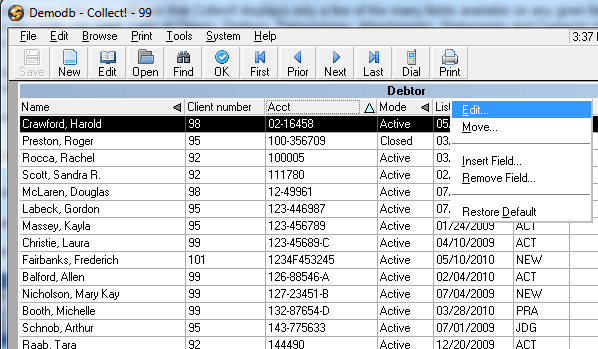
Choices for Customizing the List View

List View Choices
As shown in the screen shot above, the choices for
customizing the List View are the following.
- Edit
- Move
- Insert Field
- Remove Field
- Restore Default
We will cover each of these choices.
 Please ensure that you are signed into Collect!
in EXCLUSIVE mode as User Level 99 to make these changes.
Also, ensure that you are actually on a selected field before
committing your changes, as indicated in the steps that
follow.
Please ensure that you are signed into Collect!
in EXCLUSIVE mode as User Level 99 to make these changes.
Also, ensure that you are actually on a selected field before
committing your changes, as indicated in the steps that
follow.

Edit
Select the EDIT choice to create your own customized
List View by selecting all the fields you want to display.
The other choices, such as, Move, Insert and Remove,
enable you to work with one field at a time. The EDIT
choice allows you to select all the fields you want to
display with only one operation.
1. Select EDIT from the List View choices. You will
see the following prompt.
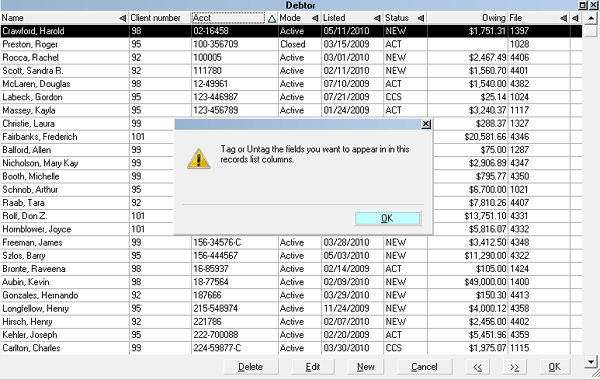
Prompt to Tag Items for List View
2. Select OK to view the list of fields that you can use
for your list. This will show all the fields on the underlying
form. In our example, these are all the fields on the Debtor
form.
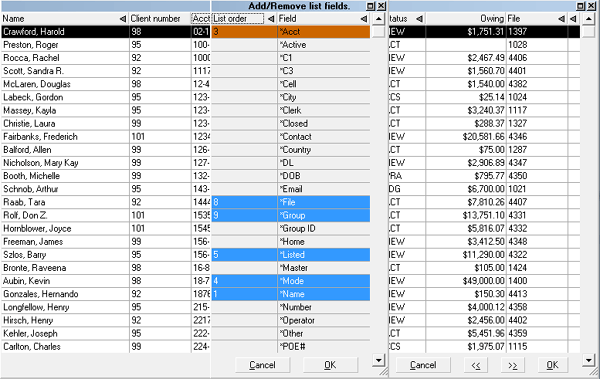
List of Fields in Underlying List
 Fields that are displayed in the list by default are
already selected in this list and they show up BLUE. The
selected item that you are actually on always shows up
as YELLOW.
Fields that are displayed in the list by default are
already selected in this list and they show up BLUE. The
selected item that you are actually on always shows up
as YELLOW.
3. Use the Down Arrow and the Spacebar on your keyboard
to select the fields you want to display in your list.
4. You must also deselect the fields that you don't want
to display. Fields in the default list view will show up as
selected in this list. Use the Down Arrow and the Spacebar
on your keyboard to deselect the fields that you want to hide.
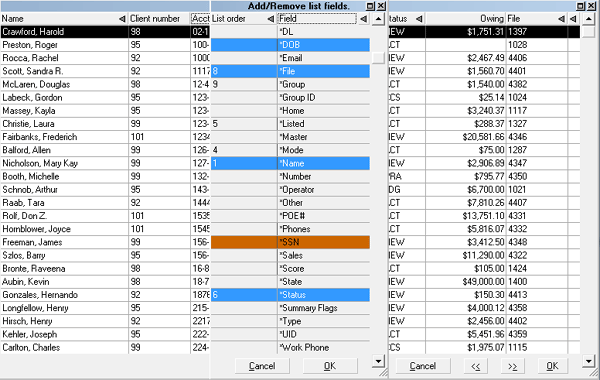
Selected Items in Editing List
5. Use the Page Up key on your keyboard when you are
finished and ensure that you have landed on one of the
selected fields. The field should turn YELLOW.
Then press OK.
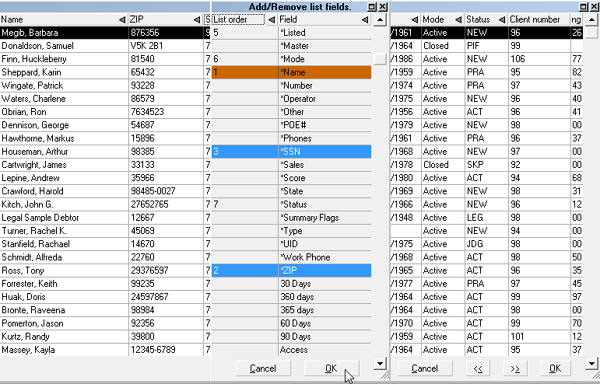
Press OK to Set Your New List View
You will see your new List View immediately.
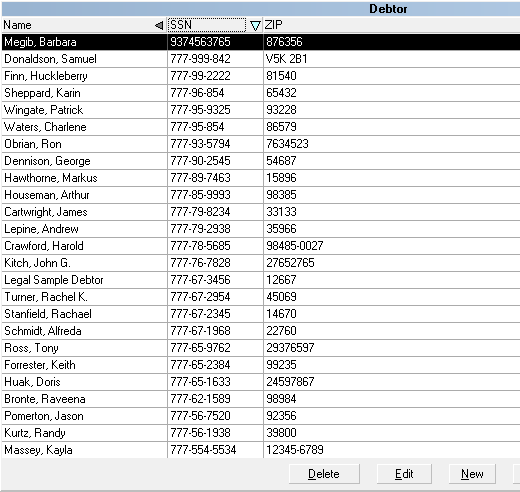
New Customized List View
6. If you wish to make further changes, you can right click
the column headings and select EDIT again.

Move
The MOVE selection allows you to move one or more fields in
the list to a different location in the List View. This choice does
not insert or remove fields. It simply changes the way the
columns are displayed.
1. Right click on the column heading for the field that you
want to move. We will reposition the File field.
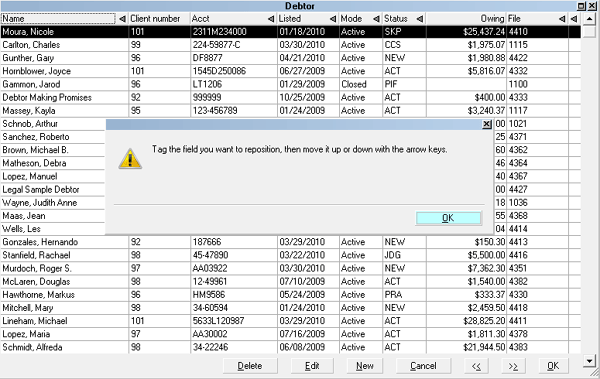
Prompt to Move Field in List View
2. Select OK when the prompt is displayed. You will see the
list of fields that are displayed in the underlying list. The field
you want to reposition will be highlighted.
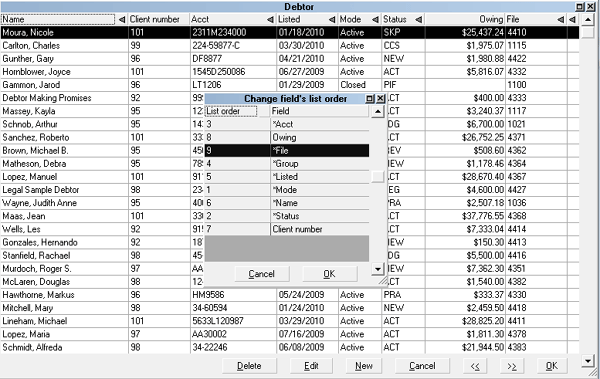
Change Field's List Order
3. Press the Spacebar to select the item. It will turn YELLOW.
Use the Down or Up Arrow to move the item. You will actually
see the item moving in the list.
 If you want to move more than one field, you can
deselect the field you just moved, by pressing the Spacebar,
then select another field and reposition it.
If you want to move more than one field, you can
deselect the field you just moved, by pressing the Spacebar,
then select another field and reposition it.
When the fields are in the right order, select OK.
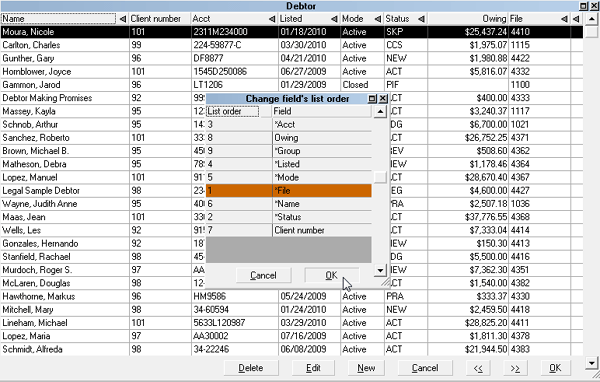
New Field Order Selected
You will see your new List View immediately.
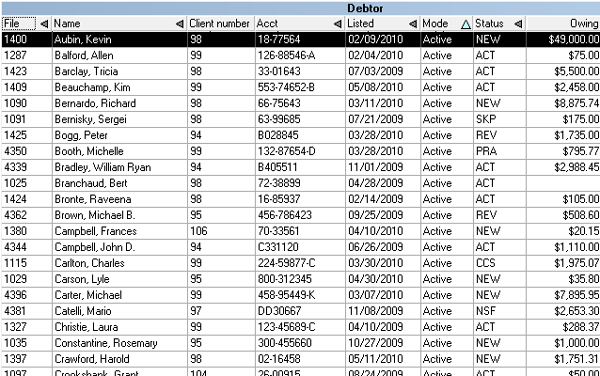
New Field Order in Customized List View
4. If you have already pressed OK and you want to reposition
another field, then you can Right click on the heading of the
next column you want to reposition and select MOVE again.

Insert Field
You can select a single field to insert using the INSERT
FIELD option.
1. Right click on the column heading where you want to
insert the new field. Select INSERT FIELD. This will display
a list of all available fields that you can select. These are
any fields in the underlying form that are not already
displayed in the current List View.
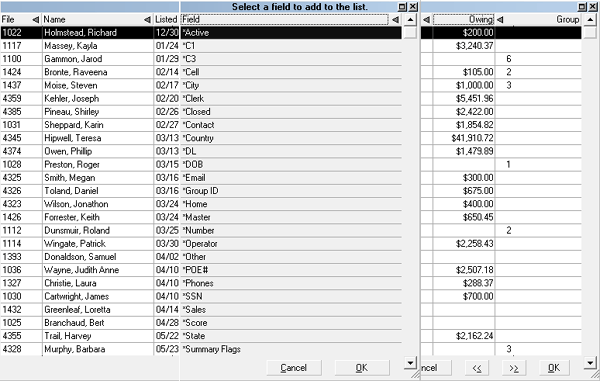
Select Field to Add to List View
2. Use your Up or Down Arrow to locate the field that you
want to insert into the List View.
3. Press ENTER when the field is highlighted, or select
the field with your mouse.
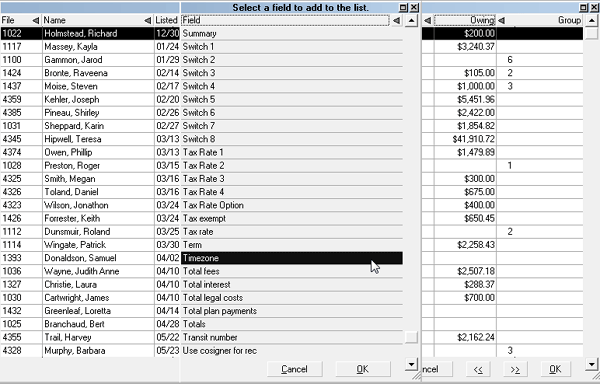
Select Field to Insert in List View
The List View will show your new choice immediately.
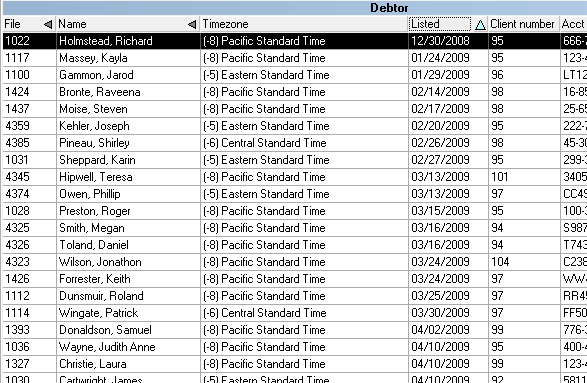
New Fields Inserted in List View
4. If you wish to add additional fields, you can Right click
on the column headings and select INSERT FIELD again.
Also you can select REMOVE FIELD if you want to remove columns.

Remove Field
It is very easy to remove fields from the List View. Simply
select the column heading for the field you want to remove
and then select REMOVE. The field disappears from the
List View immediately.

Restore Default
If you would like to restore the List View to its default
configuration and order, Right click the column headings and
select RESTORE DEFAULT. Press OK when prompted and
the List View will immediately revert to its original order
with the fields Collect! displays by default.

List Views For Operators
When you modify a list view, an LPR file is saved to the
Operator's CONFIG folder. The view will apply only to
this Operator.
If you want to make the same list view available to all
Operators, you should sign in as User Level 99 before
going through the steps outlined above.. Then Collect!
will save the modifications to a COLLECT.LPR that
everyone can see.
 You can sign into Collect! as any operator and
modify the list view further for that particular operator.
If you want to use the COLLECT.LPR instead, just remove
or rename the LPR file in the operator's CONFIG folder.
You can sign into Collect! as any operator and
modify the list view further for that particular operator.
If you want to use the COLLECT.LPR instead, just remove
or rename the LPR file in the operator's CONFIG folder.

Insert Menu Access Rights
If you want to disable the Insert Menu options for any one of
your User Levels, you can set the access rights from the
Access Rights list. The Insert Menu, lcoledit, has options
numbered 335000 to 335005 in the list of Access Rights.

Summary
Customizing List Views in Collect! enables you to display
information for your operators in ways that are most useful
to you. You can apply these steps to any list in Collect!.
Lists of Clients, Debtors, Transactions, Attachments,
Statements and Contacts may all be customized to suit
your needs. One particularly handy use for this customization
is quick printing of ad hoc reports for your own use or to send
your clients a quick update. You can display results from
underlying forms any way that you want. As long as the
fields exist in the underlying form, you can display them in
your lists, or remove them, or rearrange their order.
Customizing the List View in no way affects the underlying
data or forms. It simply relates to the way the columns are
displayed when you view lists in Collect!.

See Also
- List and Form Views
- How to Set Field or Form Properties
- How To Use Quick Printing Features

| 
Was this page helpful? Do you have any comments on this document? Can we make it better? If so how may we improve this page.
Please click this link to send us your comments: helpinfo@collect.org